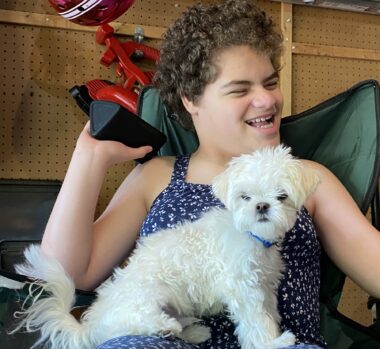How we successfully added a pet to our Angelman family
Getting a dog is a big decision for an Angelman parent
Written by |

Having a pet in your family is a big responsibility. That’s why I delayed getting one until my daughters were older. Having a daughter with Angelman syndrome means that issues like sleep, acid reflux, and even ataxia consistently require my attention. It took time for me to feel ready to take on the care of an animal in the midst of our other priorities.
Years ago, I had a conversation with a special needs parent about pets and children. This parent did not have a pet in the home and had no plans to get one. She said she simply “couldn’t take care of one more thing.” While I know many special needs families with pets, I understood exactly what she meant.
However, my youngest daughter, Jessa, who doesn’t have Angelman syndrome, loves animals. She has wanted a dog for years. I knew that eventually, we would get Jessa the puppy she wanted. Having a sibling with Angelman isn’t easy. So I try to make sure that sometimes things are simply about Jessa. This is one of those times.
What’s the holdup?
Two things held me back: managing the interaction between the puppy and my daughter with Angelman, Juliana, and adding more to my plate as a caregiver. I’ve never read about Angels having any issues with animals. What I have experienced is Juliana’s lack of awareness of people or items that need special care or touching.
Being gentle is not a strong suit of Juliana’s. One year, she tore one of my favorite ornaments to pieces to get to the bell inside. Sometimes Juliana can be handsy when she is upset or excited. Last year at the swimming pool, she had a sweet exchange with a toddler who came and sat near her. However, I kept her near me to ensure there was no hurtful pulling or hitting.
When we got our dog, Teddy, last December, I gave Jessa instructions to keep him away from Juliana if we were not in the room. At first, Juliana didn’t seem to notice that there was a new little being in the house. She has never been drawn to animals or very curious about them.
But ignoring a fuzzy little white ball at your feet is difficult to do. Juliana may not pay much attention to our Maltese, but he pays plenty of attention to her. I wouldn’t say that they are best friends, but he seeks her out and nips at her feet. She giggles when he does this and takes it in stride.

Juliana joyfully listens to music on her speaker as Teddy hangs out on her lap. (Courtesy of Jessa Johnson)
Juliana’s behavior can be unpredictable, and so can a puppy’s. To that end, we still don’t leave them alone together. We are working with her on how to pet Teddy with soft hands and not the death grip that is her default. Aggression and irritability can be common with Angelman syndrome. To help her learn, I put my hand on top of hers and say “gentle” as we softly stroke Teddy’s hair.
The transition of Teddy into our family has been pretty seamless. Yes, he has added some additional responsibilities to my plate, such as his training classes and trips to the vet. And sometimes, his schedule clashes with Juliana’s.
One day, for example, I was home alone with Juliana. Teddy needed to go outside, and Juliana’s bathroom trip timer rang at about the same time. I was also in the middle of trying to finish dinner and had my hands covered with food. The timing was horrible, but I managed the dual schedules OK. But that day was more of an exception than the norm, so things are balancing out.
Teddy nips at our feet and gives us too much love. And he has been welcomed into our family with open arms.
Note: Angelman Syndrome News is strictly a news and information website about the disease. It does not provide medical advice, diagnosis, or treatment. This content is not intended to be a substitute for professional medical advice, diagnosis, or treatment. Always seek the advice of your physician or other qualified health provider with any questions you may have regarding a medical condition. Never disregard professional medical advice or delay in seeking it because of something you have read on this website. The opinions expressed in this column are not those of Angelman Syndrome News or its parent company, Bionews, and are intended to spark discussion about issues pertaining to Angelman syndrome.







Leave a comment
Fill in the required fields to post. Your email address will not be published.